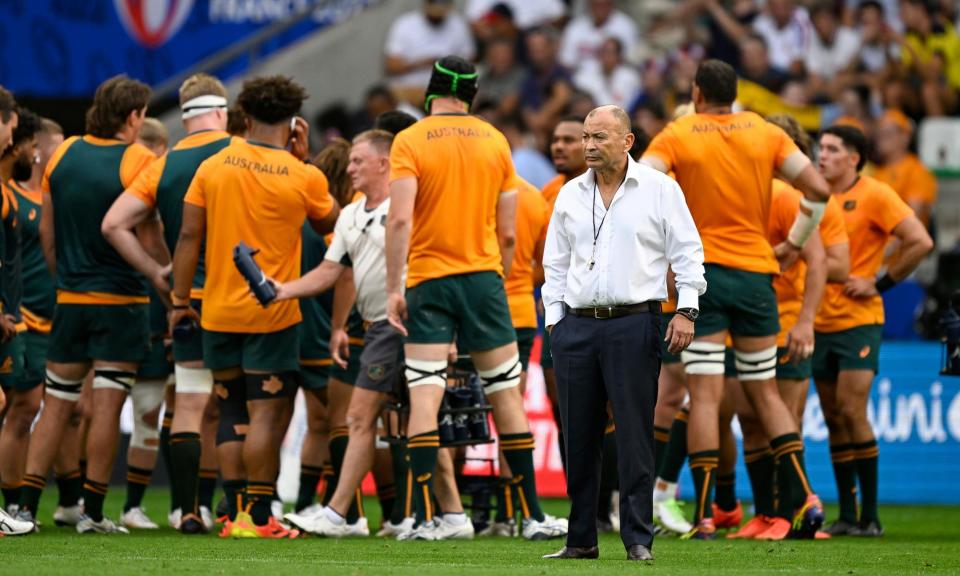Rugby Australia reveals $2.6m of unapproved expenses were spent on World Cup

Rugby Australia boss Phil Waugh has revealed $2.6m in unapproved expenses were invested in Eddie Jones’s disastrous 2023 World Cup campaign. While declining to single out Jones for blame, Waugh on Thursday said the over-spend was “unacceptable” and would not happen again.
“The over-investment that was unapproved was $2.6m, which covered three main elements, being team costs, staff travel and then player benefits,” Waugh said, adding that RA only found out the extent of the excess spending “retrospectively”.
“So a lot of that came through post-World Cup ... You want to set the team up for success. The reality is that 86% of our revenue comes through the men’s XVs program for Rugby Australia, and a successful World Cup program is critical to that.
“And I guess there was lenience given in the hope that we would succeed at the World Cup and make it deep into the tournament. Clearly that didn’t happen, but the circumstances were quite unique.”
Asked how the over-spend could reach such a vast sum, Waugh said: “Delegation of authority is important and clearly there were breaches in that area and we’ve made personnel changes on the back of some of those breaches. That over-investment, that’s not acceptable and it won’t happen going forward.”
Waugh refused to single out Jones or the Wallabies’ World Cup manager Chris Webb for blame.
“I’m not going to point the finger at one individual,” he said. “I think it was a cultural deficiency that we need to rectify.”
The revelation came as Waugh also reported broken trust as being among the strongest feedback coming from players who participated in RA’s external review into the Wallabies’ year from hell under Jones.
After quitting just 10 months into his five-year deal, Jones has since signed on as Japan’s national coach, despite denying he was interviewed for the Brave Blossoms position before presiding over the Wallabies’ worst-ever World Cup campaign.
“The lack of trust certainly comes through and we talk through elements of culture as well as governance there,” Waugh said. “The actual specifics of Eddie and the linkages to Japan, not so much. But I think that’s the broader lack of trust across the system.”
Waugh said he hoped the findings of an external review, which were released on Thursday and include a recommendation to “reset the leadership structure” of the men’s national side and improve culture more broadly, would help “draw a line in the sand” after a tumultuous period for the game in Australia.
Under Jones, an inexperienced Wallabies squad crashed out of last year’s World Cup at the group stage for the first time in the team’s history, before the coach walked away from the national set-up just 10 months into a five-year contract.
Amid a storm of criticism, RA vowed a review into the debacle would be undertaken by a four-person panel, consisting of former internationals Andrew Slack and Justin Harrison, as well as renowned industry expert Darlene Harrison and Pasifika advisor Moana Leilua.
Their lengthy list of recommendations to RA were released on Thursday, and focused on ways to improve the Wallabies’ high performance program.
They were grouped into five categories: high performance strategy, the Wallabies and high performance programs, culture, governance and the national coaching program.
The report called for greater interaction between the RA board and national players in an effort to “build trust, promote transparency and improve culture”.
It also recommended RA undertake a review into governance at the elite level to ensure fit-for purpose polices and processes, including a robust process for whistleblowing and a duty of care charter.
RA said some of the recommendations had already been put into place, including the restructuring of the high-performance department and the hiring of Jones’s successor Joe Schmidt, along with Peter Horne and David Nucifora in the set-up.
Waugh, who replaced former CEO Andy Marinos just three months out from the World Cup last year, highlighted the crucial role the Wallabies have to play in the health of the game in Australia.
“We have been stressing the importance of an aligned and united rugby ecosystem across all levels, and it is essential that the Wallabies lead the way – the Wallabies are an important team to Australia, with a long and storied history,” Waugh said.
“I am confident that this review will help draw a line in the sand as we strive to implement the processes and structures that will drive the Wallabies towards a successful future.”
The Wallabies will play their first game since signing off in France with a win over Portugal last October – and their first of the Schmidt era – with a home fixture in June against Wales at Allianz Stadium in Sydney.

